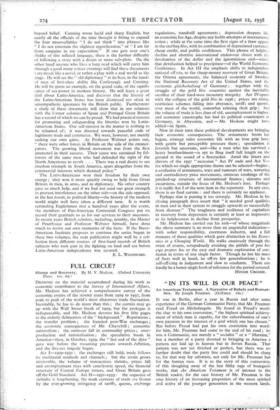FULL CIRCLE ?
Slump and Recovery. By H. V. Hodson. (Oxford University Press. tos. 6d.) DRAWING on the material accumulated during his work as economic contributor to the Survey of International Affairs, Mr. Hodson has achieved a comprehensive survey of the economic events of the stormy years from 1929 to 1937, from peak to peak of the world's most disastrous trade fluctuation. Inevitably, he has to do more than this ; the curtain may go up with the Wall Street break of 1929, but the prologue is indispensable, and Mr. Hodson devotes his first fifty pages to the orderly delineation of the " background." Reparations ; the transfer problem ; the frenzied post-War exchanges ; the economic consequences of Mr. Chu rchill ; economic nationalism ; the. ominous fall in commodity prices ; over- production and rationalisation ; the speculative boom in America—then, in October, 1929, the " last sod of the dyke " gave way before the mounting pressure towards deflation, and the five-act tragedy began.
Act I-1929-1931 : the exchanges still hold, trade follows its traditional methods and channels ; but the strain grows intolerable, the volume of transactions shtinks, prices fall and unemployment rises with cataclysmic speed, the financial structure of Central Europe totters, and Great Britain goes off the Gold Standard. Act 11-1931-1933 : the sequence of defaults is lengthening, the weak currents of trade are frozen by the ever-growing stringency of tariffs, quotas, exchange regulations, standstill agreements ; depression deepens like an economic Ice Age, despite any feeble attempts at international action ; while at the same time the first signs of a thaw appear in the sterling bloc, with its combination of depreciated currency. cheap credit, and public confidence. This phrase of helpless decline and abortive international endeavour closes with the devaluation of the dollar and the ignominious end—which that devaluation helped to precipitate—of the World Economic Conference. In Act III the emphasis shifts to independent national eff irts, to the cheap-money recovery of Great Britain, the Ottawa agreements, the balanced economy of Sweden, the National Recovery Act of the United States, and the economic gleichschaltung of Germany ; together with the struggle of the gold bloc countries against the inevitable sacrifice of their hard-won monetary integrity. Act IV opens with the collapse of the gold bloc in 1936 ; prices are rising, restriction schemes falling into abeyance, tariffs and quotas, over most of the world, somewhat relaxing their grip ; but the volume of trade is less than of old, unemployment is higher, and economic catastrophe has had its political counterpart in Germany, in Abyssinia, and — Mr. Hodson might have added—in Spain.
Now in their turn these political developments are bringing their economic consequences. The armaments boom has begun, strategy rules economic life with an iron grip here, with gentle but perceptible pressure there ; speculation is feverish but uncertain, and—like a man who has survived a heavy bombardment—is apt to fling itself full length on the ground at the sound of a firecracker. Amid the jitters and shivers of the 1937 " recession " Act IV ends and Act V— for which no single appropriate theme can be selected—begins ; a confusion of armaments, wars and rumours of wars, wavering and contradictory price movements, ominous creakings of the patched-up structure of international finance ; alarums and excursions, outside the focus of Mr. Hodson's lens. Perhaps it is really Act I of the next item in the repertory. In any case, there is no final curtain : and there is certainly no applause.
Perhaps that is putting it too strongly. Mr. Hodson in his closing paragraph does assert that " it needed good qualities in men and in their system to struggle upwards so successfully from disaster." The toughness and resilience of capitalism in recovery from depression is certainly at least as impressive as its helplessness in decline from prosperity.
Mr. Hodson has carried out his task—of whose magnitude the above summary is no more than an ungrateful indication— with sober responsibility, enormous industry, and a full measure of those qualities which gave distinction to his Econo- mics in a Changing World. He walks cautiously through the maze of events, scrupulously avoiding the pitfalls of post hoc ergo propter hoc or the easy and dramatic explanation of con- fusion in terms of any single factor. Though he has his mass of facts well in hand, he offers few generalisations ; he is self-effacing in judgement and slow to condemn. There can hardly be a better single book of reference for the period covered.
- HONOR CROOME.






































 Previous page
Previous page